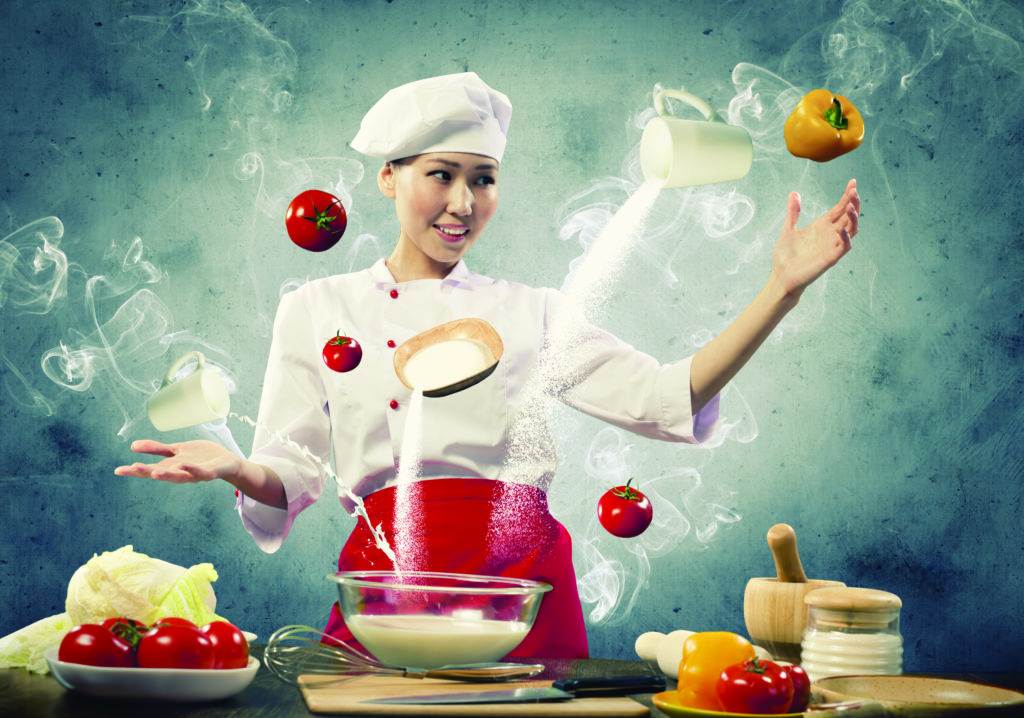Cook Your Way to Creativity
BY FAISAL HOQUE
Like many, I was introduced to cooking when I started college at 17—to survive. Since then I have traveled many miles, experienced many cuisines, and cooked many meals.
Along the way I have learned a few things about food, the process of cooking, and the impact it makes on our mind, body, and soul during good times and bad. Food is the most fundamental of needs for our survival, and almost every major event in our lives revolves around it.
It plays a vital role in the development of social interactions and social relationships. I find food to be sacred and the process of making food to be awakening and insightful. Although I am not professionally trained, cooking has become a joyful passion.
The process of making food has taught me to be mindful, embrace creativity, and push for mastery. Below are a few lessons that might make you think differently the next time you enter your kitchen.
Ritualistic Cooking Can
Enhance Mindfulness
Along with billions of others around the globe, I suffer from the daily grind of life. My affinity with mindful living is not grounded in any kind of scientific research—rather from constant self-analysis. I have found cooking is a means toward that journey of mindfulness. It’s been said that the only two jobs of a Zen monk that are more important than sitting zazen (meditating) are cooking and cleaning. Cooking is a great way to practice mindfulness. Mindfulness is a state of active, open attention to the present. It simply means living in the moment and awakening to experience. And it takes practice to be mindful. I have found that ritualistically cooking on a regular basis enhances my ability to be mindful about everything else I do.
In the 13th century, Japanese Zen master Dōgen wrote Instructions for the Cook. In examining the manners and methods of preparing a meal at the monastery, he reveals how to “cook,” or refine, your whole life. In one such instruction, he says, “When you boil rice, know that the water is your own life.”
How do we cultivate the mind that cares as deeply for an ordinary thing, like water, as it cares for our very own life? Sounds simple, but it’s actually pretty hard—go ahead and try it. It comes from putting our entire mind into those simple tasks, concentrating deeply, and doing them intentionally and completely.
I believe that consciously thinking about the ingredients we choose, their preparation, the way we cook, and the way we eat contributes toward the development of mindfulness.

Conscious Openness Is at the
Heart of Any Creative Process
I don’t ever follow a recipe. I like to experiment, mix and match, and design my meals. I make my decisions based on availability, my eating companions, and the hour of the day.
Over the years this awareness of resource, audience, and need helped me hone how I think. When I started cooking at 17, just like with life, I was unsure of the kitchen. Now I try to create my food with confidence. It is entirely natural for me to mix Japanese mirin with Indian turmeric and Mexican chilies.
Just like making music or poetry, cooking requires understanding interconnectedness and harmonies. Anyone can mix and match two random sets of ingredients, but not everyone can cook. Understanding the relationships between the ingredients and their interactions is crucial to creating a successful dish. This conscious openness is precisely what is at the heart of any creative process regardless of what we do and the medium we use.
Mastery Comes from Enthusiastic
and Devoted Practice
Most mornings I prepare my son a balanced breakfast and a lunch between 6 a.m. and 6:15 a.m. I have about 15 minutes to cook eggs, toast bread, chop fruit, make a sandwich, etc. Not much time, right? Actually, it’s plenty. It comes from skill, practice, confidence, and organization. It begins with breaking down the process into mini goals:
- I first decide what I want to cook based on what’s available.
- I do all the prep work needed to create the meal.
- I start cooking based on the cooking time and how I will serve the meal.
Along with clear thinking, being productive requires skills. And mastery comes from enthusiastic and repeated, devoted practice.
I have come to believe that whether we like to cook or not, these same principles apply to just about anything else we undertake. It’s about the awareness we experience, the devotion we apply, and as a result, how we create.
Happy cooking—whatever you may be cooking up!
Copyright (c) 2017 by Faisal Hoque. All rights reserved.
Serial entrepreneur Faisal Hoque is the founder of Shadoka, which enables aspirations to lead, innovate, and transform with its accelerators and solutions. He is the author of Everything Connects: How to Transform and Lead in the Age of Creativity, Innovation, and Sustainability and other books. FaisalHoque.com